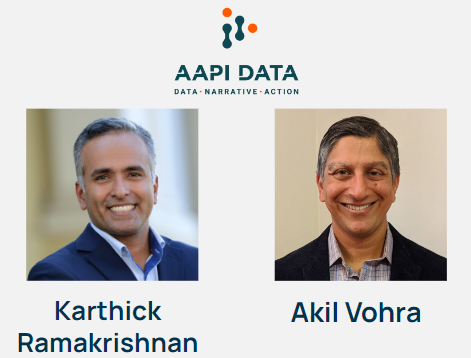Preparing for the Big Shift: our July Virtual Community Discussion
This month, we welcomed Karthick Ramakrishnan and Akil Vohra from AAPI Data to discuss Statistical Policy Directive No. 15, the latest set of federal standards for maintaining, collecting, and presenting data on race and ethnicity.
AAPI Data began the discussion with the case for the need for disaggregated data, and gave examples of how outcome disparities between the subgroups contained within the term “Asian American and Native Hawaiian Pacific Islander” can only be understood when the data is presented on the appropriate level. Karthick and Akhil also provided a glimpse into how they inspire action from policy makers by engaging their curiosity through a quiz that tested attendees.
In the discussion portion of the session, attendees were curious about protecting the utility of data when disaggregating, stakeholder engagement, and the pros and cons of representing diverse peoples in a single group.
The key takeaways from this discussion are:
- Disaggregated data is a must for understanding the issues: Aggregated data can obscure the experiences of subpopulations and hide the need for policy change, while disaggregated data can reveal the impact of current policy or social factors. For example, it has been widely reported that Asian American populations experienced less COVID deaths per capita compared to other ethnic groups in the US. However, data by disaggregated by ethnicity shows that some AANHPI populations were disportionately impacted by the virus.
- Data alone isn’t enough: AAPI Data’s three pillars are Data, Narrative, and Action. Narrative is what makes the data feel “real” and helps move the policy process forward to “Action.” AAPI Data shares the narratives of its community through its recommendations and press-ready reports.
- Engage curiosity to inspire action: AAPI Data presents data to stakeholders through traditional means such as reports and charts, but will also use playful methods such as quizzes to grab legislators’ attention. This inspires policy makers to learn more, and ultimately understand the need for change.
- Be part of the change to be well positioned for future work: If you can be part of the change at the state level, you can advocate for the data your organization needs and build relationships with key stakeholders for other projects. AAPI Data has campaigned for many years for the need for disaggregated data, and are starting to see change in data collection standards through Statistical Policy Directive No. 15. The result will be huge swaths of data that was previously unavailable, further enabling AAPI Data’s work.
To review AAPI Data’s presentation slides, please click here. A recording of the presentation portion of the session is viewable here.

